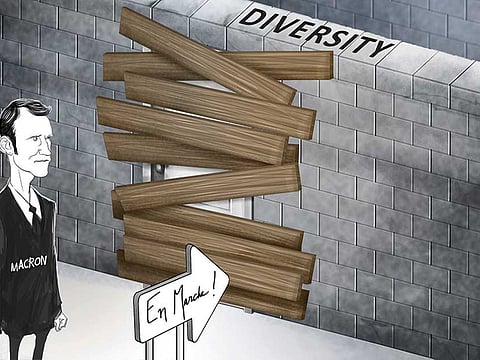Macron inspires hope but faces uphill task
The presidential favourite has chosen a difficult time to recast France as a diverse, inclusive nation

At age 39, Emmanuel Macron is a breath of fresh air in French politics. But can he convince enough voters that he can take France into a 21st century of openness and confident, diverse modernity? With the spectre of Marine Le Pen looming, a lot seems to rest on one young face, just two weeks ahead of a presidential election set to define not just the fate of France’s democracy but also the future of much of Europe.
Optimists have been tempted to draw comparisons with Justin Trudeau (the good looks, the energy, the positive messaging) and the early years of Tony Blair (the break with old left-wing orthodoxies, the search for a new centre-ground, and a taste for the latest marketing techniques). Macron does have a bit of that. But the parallels only go so far.
Neither Trudeau nor Blair found themselves having to confront a deeply entrenched, historically rooted, far-right movement such as France’s National Front. Both also benefited from the backing of well-established parties — something that Macron, with his barely one-year-old start-up party, En Marche! (Forward), painfully lacks. Nor can 2015 Canada or 1997 Britain be easily compared with 2017 France, its many tensions, its sour mood, its sense of political unravelling, its anti-elite sentiment and its many social ills.
There is one similarity that deserves attention: just like Trudeau and Blair, Macron wants to claim a strong narrative on diversity and inclusiveness. In an age of populism thriving on nativist, identity politics, and at a time when France is still traumatised by a wave of attacks carried out by homegrown terrorists, that means he faces some strong headwinds.
Trudeau has made a staple of celebrating Canada’s tradition of welcoming immigrants and refugees. In the 1990s, Blair popularised the Cool Britannia slogan that sought to reinvent patriotism through the embrace of ethnic and cultural diversity. Macron is the only French presidential candidate with a serious chance of reaching the Elysée palace who unwaveringly seeks to recast France’s secular, republican model into a project where minorities, especially citizens of Arab and Muslim descent, would feel more at ease.
A presidential TV debate last week shed yet more light on how difficult this is. France increasingly grapples with defining its sense of collective belonging. National identity is arguably the most contentious topic in this campaign — if we can leave financial scandals and public morality to one side. On the issue of diversity, Macron clashes with Le Pen (they are neck and neck in polls), as well as with important sections of the mainstream right.
Outcry and cries of ‘Traitor!’
On TV Macron was questioned about a statement he’d made in February during a visit to Algiers saying “colonialism was a crime against humanity” and that France should “apologise” for it — words that triggered an outcry in France.
His interlocutor was a history and geography teacher. She accused him of distorting historical facts and seeking to “fuel resentment among some young people who have difficulties feeling French” — a reference to young Muslims.
Macron pushed back. He spoke of France’s need to come to terms with the past by acknowledging it, and to “reconcile conflicting and complex memories”. He said “citizens, especially in some suburbs, are far from appeased”, and that society continued to struggle with “multiple traumas”. He added that, as a result of his comment on colonialism, he’d received death threats from National Front supporters, calling him a “traitor”.
These aren’t entirely new topics in France, but it says a lot that the colonial past should be lobbed into this campaign so close to the vote. Le Pen’s National Front has its roots in the Algerian war. She’s tried to clean up the party’s racist image but her supporters’ rallying cries of “This is our country!” leave little doubt as to who is being stigmatised. The fallout from terrorism is eagerly added to the mix.
Swiftly drowned out is the fact that, according to surveys, racism isn’t on the rise in France. The percentage of “mixed” marriages (immigrant with non-immigrant) is the highest in Europe. Surveys also show that an overwhelming majority of Muslims express support for the republican secular model and say they consider themselves French. What they suffer from is the feeling they aren’t recognised as such by society.
This is where the comparison between Macron, Trudeau and Blair hits a wall. Canada has no colonial history. Britain dealt with decolonisation in a very different manner from France, which fought wars during that period. And France isn’t ready, it seems, to open a museum recounting the crimes of colonialism. By contrast, there is a fascinating exhibition in Amsterdam’s Rijksmuseum about Dutch history in South Africa. And in Berlin this year, a major exhibition looked into what the Germans did in Namibia. Paris does have a “museum of immigration”, in which the diversity of family stories is vividly described. But it entirely sidesteps the many chapters of colonial history.
Macron was right, and brave, to have brought up that past, even if it opened up a Pandora’s box. The “us versus them” bigoted narrative of the French far right weighs heavily on this election, however intense Le Pen’s efforts to cast herself as defender of “the people” against the “system”, a choice of words that designates Europe and the “elite” all lumped together.
Macron is an oddity, and a welcome one. Whether he will be able to save France from its political ghosts is another matter.
— Guardian News & Media Ltd
Natalie Nougayrède is a columnist, leader writer and foreign affairs commentator for the Guardian.


